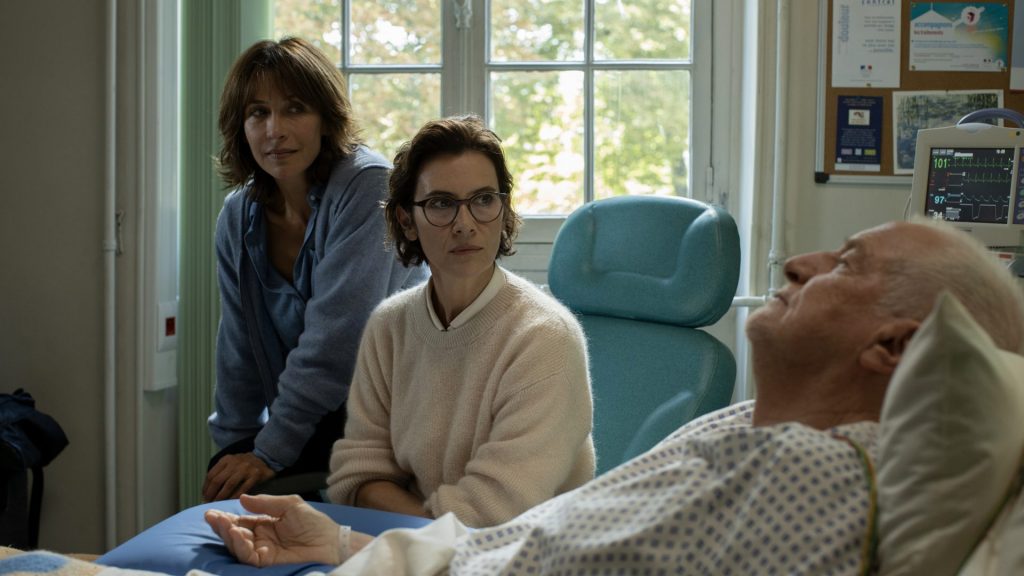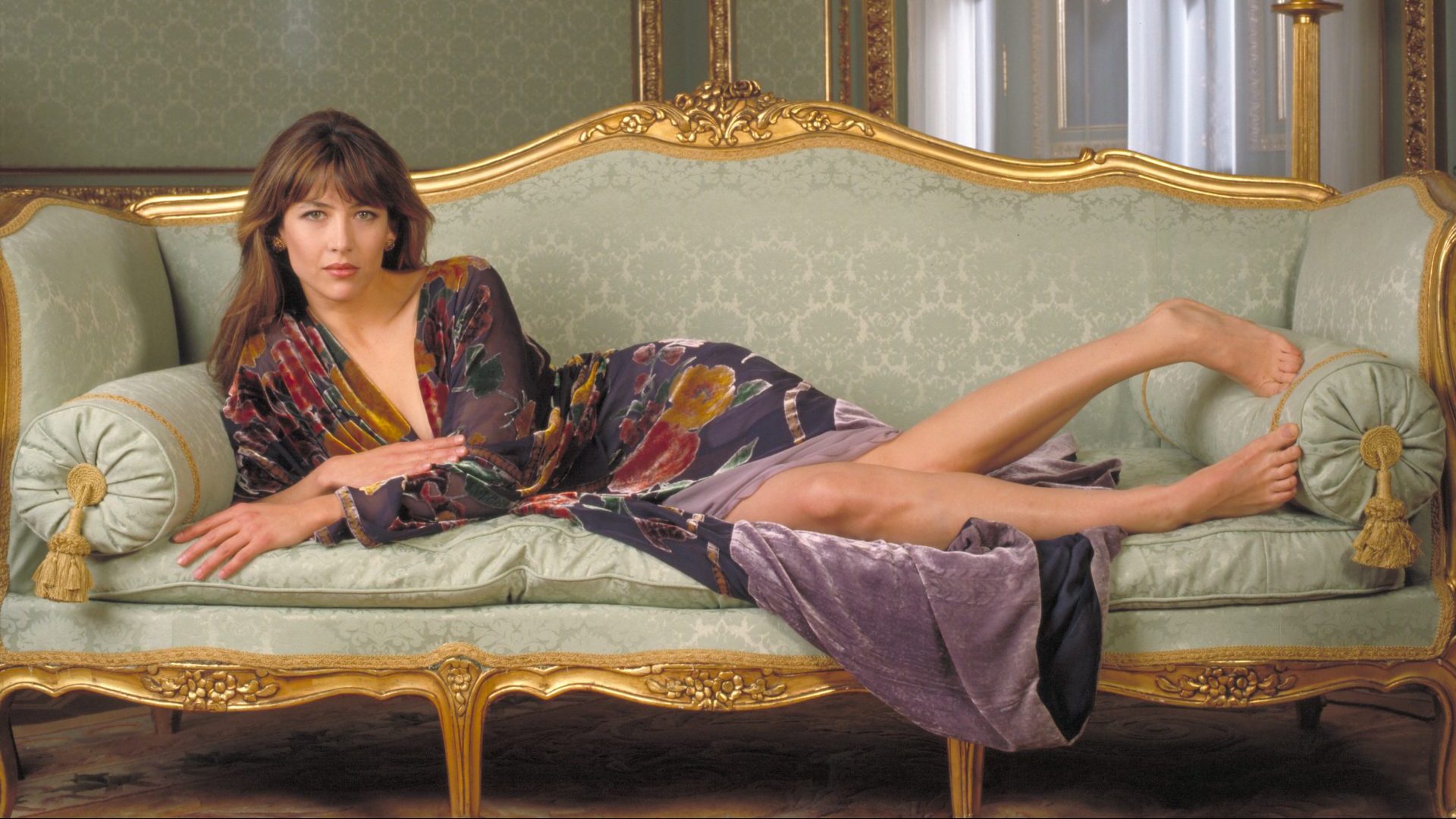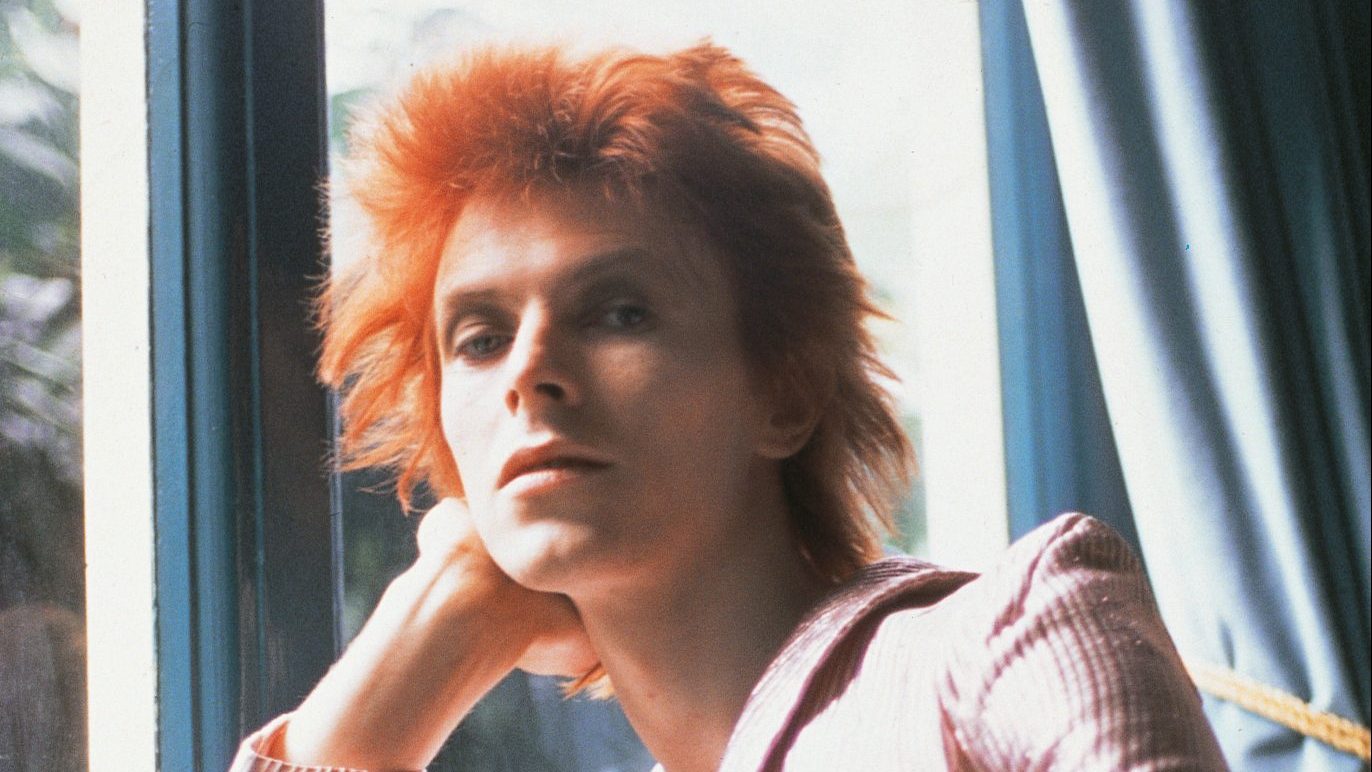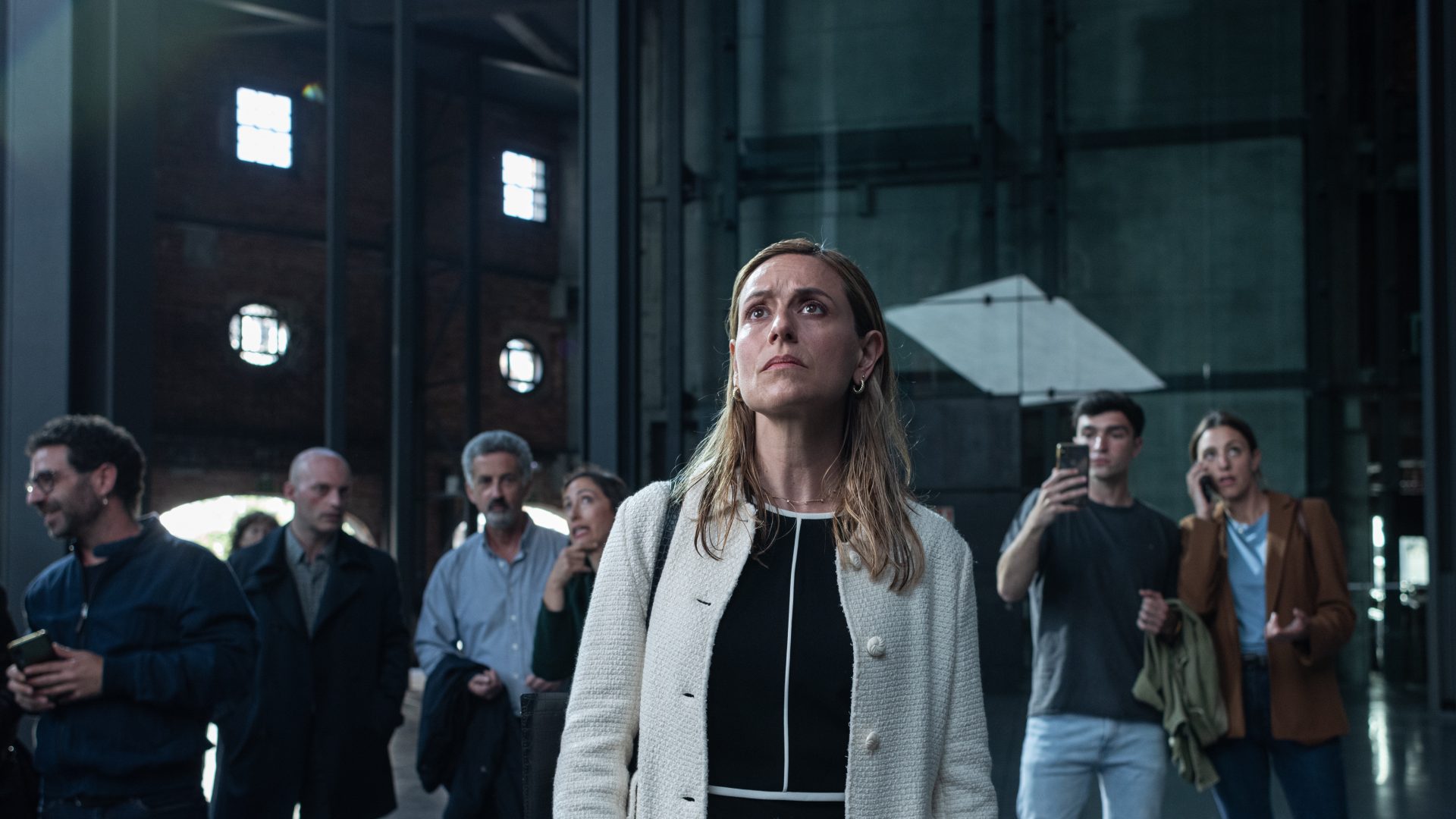I meet a lot of famous people in this job. I’m never nervous, but when I realised I was about to talk to Sophie Marceau, my knees wobbled.
What was going on? I suddenly flashed back to a sunlit September schoolday, the first week of term and a new French teacher, Denis Ogan. We were 14.
He brandished a magazine and told us that, if we were ever to be good at French, we needed to immerse ourselves in it. We needed to tell our parents to get a subscription to a weekly French magazine and he recommended this one, Paris Match.
The collective lower jaws of the Fourth Form (A set) hit the ground. There she was, draped across the front cover, the most beautiful, most lovely,
most… French… girl any of us had ever seen. “Sophie fait scandale” said the text, and we could all translate that.
Monsieur Ogan dropped the magazine on one of the desks and we all crowded round, flicking frantically to more Sophie. She was in a film called La Boum 2 and it was an outrage. Not to us. I was smitten. The Paris Match subscription office must have seen a spike in orders from the London suburbs.
I got mine and over the ensuing weeks, I did actually begin to read some text although, let’s be honest, only after flicking through for more pictures of Sophie. I soon found out that she was not alone and that there were many beautiful women in France, many of them in films, which seemed to be quite the mainstay of Paris Match articles, along with stories about Stephanie of Monaco, François Mitterrand and, also very cool, Yannick Noah.
But it was always Sophie. You can’t beat a coup de foudre.
Over the years, you’d see her in a few movies, but not that many. In Braveheart, for example, she was all buttoned up and nothing like the free spirit of Paris Match 1983. She wasn’t like Juliette Binoche or Isabelle Huppert or even Isabelle Adjani, of whom we heard and saw quite a lot.
But then, when I started covering Cannes film festivals, Sophie would grace the red carpet every year and the cover of Gala magazine, although she’d hardly ever feature in any of the movies. Perhaps due to her breakthrough in the teen movie La Boum, she’d never quite shaken off the whiff of snobbery or been able to ascend to the highest levels of French actress artistry.
So here I am, fully 40 years on from the fateful day of the Paris Match cover, and I’ve got Sophie Marceau on Zoom. She’s radiant on my computer screen. We’re here to talk about her new film, Everything Went Fine, which screened at Cannes 2021 and was rapturously received, although not rewarded with a prize.
Directed by François Ozon, it now arrives on UK cinema screens, a beautiful, melodramatic weepy of a film, about a woman (Marceau) asked by her ailing father (the brilliant André Dussollier) to send him to Switzerland to die.
Suddenly I realise Marceau is probably the reason why I do what I do –
why I love films, love French films, why I went on to study French literature, to live in France, to write and talk about French cinema. It’s probably all down to her. Quite an existential moment to have on a Zoom call. So we start by talking about death.

Sygma/Getty)
“Let’s talk about death,” she says, then. “For me, it’s not something you think about until it happens to you. I’m like my character in the movie. You don’t deal with it until you’re faced with it, and this is her father and, you know, what would you do? It’s a dilemma and I can’t speak for everyone in society, but in the film, she chooses to help the person she loves. But it tears her apart. I think the film’s about not being in denial on this subject.”
There’s something new about this performance. It’s a very unadorned
Marceau role, not glamorous at all, but very much about hospitals and organising logistics, and dealing with an irascible old man and everyday life.
There’s something of the soap opera about it.
“Yes, but it’s very complex, too,” she says. “It’s this woman dealing with a
tough father who is critical, moody, manipulative, charismatic, charming
and who’s dumping a huge problem on her to deal with. I think a lot of women, a lot of children of parents, all can understand something of this, and it’s my job as an actor to make it psychologically rich. So that’s why it’s not a heavy film, you know, even if it talks about death, I find that it’s refreshing, it opens windows and gets people talking.”
The director agrees and says that’s why he picked Marceau, regularly
voted France’s favourite actress in magazine polls, in which she comes in
streaks ahead of stars such as Binoche, Laetitia Casta or Audrey Tautou. “She’s a huge star in France, maybe not everyone knows that, quite how much she is loved. She’s very different to all the other actresses, because she feels part of all our families. You are not alone,” he tells me. “We all fell in love with her in the 1980s because of La Boum, all of us. And now she is like
family to our generation, so I thought it would be a way for the audience to feel part of this story, like it was something they were all going through, that even Sophie has to go through.
“She’s an actress who is very particular about her roles – I’ve asked her many times to be in my films, and she always just says ‘no’ – but I know she needs to find something in the story to be involved in and this had some resonance for her. And we get to see she’s a really good actress, actually.”
I ask Marceau what it is about a role and why she does so few movies. “I don’t know, really I don’t”, she claims. “I read the scripts, I do and I can’t say what it is that I Iike. I know I can’t be exhausted by my films so I can’t do three a year like most actresses, that’s too much pressure on my emotions. I like to work but I find it very hard to give myself. I need to really trust the director.”
What does she need for that to happen? She doesn’t appear very fragile or wary, even with press interviews. “Oh, I’ve been famous for so long, I’ve been through all my shit before, got that out of the way. But I need to feel I’m being listened to, and that I’m of interest to the person watching me through the camera. You know I’m going to give them all my heart, open my heart for the role, so I need respect and intelligence and understanding. It’s very simple, really, but I think it can take a long time for an actress to learn these things. I was fortunate that I understood it very early on.”
But if things had been different when she started, if there were more female filmmakers for instance, would she have been less objectified and had a different career? “Oh, I’m not going to change cinema,” she says. “It’s always been about sex and glamour. I’m grateful for the #MeToo movement and I think it will change things. But I’ve been famous for ever and I dealt with all that since I was 13 years old. I was strong and independent and I think maybe a bit lucky. I have never been very strategic in my choices, because I didn’t have to be.
“But I’ve done all kinds of movies, from debuts, to blockbusters, to period dramas to comedies and commercial movies and auteur films. I’ve been careful to explore all kinds of cinema and in the end, wherever you are, in France or in Hollywood, you just want to be happy with your role and get to the set and begin shooting.”
She was a brilliant Bond woman, one of the best, Elektra King in 1999’s The World Is Not Enough, directed by Michael Apted. It’s the film with the Thames chase, and also the one with Denise Richards as nuclear physicist Dr Christmas Jones. It was that kind of era for Bond. But Marceau is elegant
and deadly and classy and sexy throughout.
“I loved my role in that,” she says. “I loved the director, and I’m proud of being in Bond… I have loved watching them re-invent it and how it has evolved now and changed with the times and I’m very impressed how smart they are at keeping things fresh.”
Death is clearly the big topic of the moment. I mentioned it just last week in my interview with Mia Hansen-Løve, whose latest film, Un Beau Matin, resonates with Everything Went Fine. Both are films with innocuous titles that mask whirling emotions about parents’ illnesses. Even James Bond, these days, can die.
“I know,” says Marceau. “It’s the new trend in movies, perhaps. It’s quite
commercial actually, I think, because everyone has some experience of it and we are no longer afraid to talk about it. It is time that society faced up to it and had ways to deal with it collectively.”
Ozon says his hardest task on set was making sure his actresses (Marceau’s
sister is played by Géraldine Pailhas) weren’t crying all the time. “Oh my god,” he recalls. “They were all thinking about their fathers and would just burst into tears at any moment. I had to keep shouting out ‘Pas de pleureuses’. No cry babies, please. I mean I understood all the emotions, but I want the audience to reach the tears by themselves, not because everyone on screen is crying. I was trying to be concrete and real, not melodramatic.”
The presence of Charlotte Rampling helps here, playing the ex-wife and bringing her usual steely eye to the screen. But it’s Marceau’s film and one
that’s tipped to bring her awards recognition, something that’s been remarkably absent from her long career, since the César in 1983 for her
breakthrough in La Boum 2.
“I have never looked for awards,” she says. “I don’t try for them or choose my
films to get them. Maybe I should have, but I can’t predict it and I’m not jealous at all of the actresses who win them.”
I’m amazed by Marceau. I didn’t really know what to expect after all this time of thinking about her, but she’s funny, easygoing and interested.
“If I look back on my career, which I don’t do unless I’m asked to, in an
interview, for example,” she grins at me, “then I’m very happy with that. Some films are more successful than other ones, but I’m always happy with the role and the job that I’ve done.”
So you might say, then, that, er – I’m nervous about this one, as I risk a pun
– you know, Everything Went Fine? A pause. And then she laughs. “Oui, merci,” she says, still smiling. “Tout s’est bien passé.”
Everything Went Fine is on UK release from June 17




